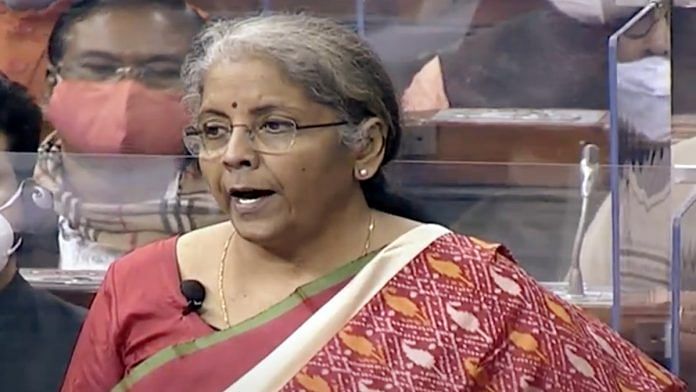New Delhi: In a move that has drawn severe flak from Odisha, West Bengal and Chhattisgarh, Union Finance Minister Nirmala Sitharaman Monday introduced a new cess — the Agriculture Infrastructure and Development Cess — in the 2021 Budget.
The government, however, clarified the cess will not increase the prices of commodities.
If at all, end prices of commodities will either remain the same or come down, Sitharaman said. This is because the government has chosen to levy the cess on certain items, while reducing the corresponding excise and customs duties on those products to ensure there is no change in their final prices.
The proceeds of the cess will be utilised for building agriculture infrastructure, Sitharaman said, adding that they will not be transferred to the Consolidated Fund of India.
The levy of the cess is estimated to garner Rs 30,000 crore annually and likely to be extended beyond the 2021-22 fiscal year.
But what has caused concern among the three states is that while taxes collected and transferred to the Consolidated Fund of India are shared with the states in a ratio recommended by the 15th Finance Commission, proceeds collected from cesses are not shared with the states.
The government has also not chosen a new stream of collecting revenue from the cess, but reduced taxes like customs and excise duties that were shareable with the states.
According to the recommendation of the 15th Finance Commission, 41 per cent of central taxes are shared with the states.
M. Govinda Rao, who was a member of the 14th Finance Commission, said, “The trend has been that cesses are levied by the Centre as a move to safeguard the Centre’s revenues and not share the proceeds with the states and in a way nullify the recommendations of the finance commission.”
But the Constitution allows it, he added.
Also read: Total allocation for health ministry up only 7%, no increase in budget for Ayushman Bharat
‘Loot on federalism’
The move has drawn severe criticism from Odisha, West Bengal and Chhattisgarh government.
Naveen Patnaik, Odisha Chief Minister, said in a recorded message that centralisation of revenues through introduction of the cess will “weaken the Centre-state fiscal balance”.
He also pointed out how the amount of funds that are being transferred to the state from the Centre is coming down and how it adversely impacts the state’s ability to fund capital expenditure.
This is the first budget in post #COVID19 scenario and there are lot of new challenges which this budget is expected to address. The positive points in #Budget2021 include: Focus on capital investment to push growth, reintroduction of developmental financial institution. pic.twitter.com/VOxrTaupsX
— Naveen Patnaik (@Naveen_Odisha) February 1, 2021
West Bengal Finance Minister Amit Mitra has written to Sitharaman, opposing the levy of the cess.
“You do not have to give the money collected from the cess to the states. When the current government came to power in 2014, cesses and surcharges were 2.5 per cent of the total revenues. This has now increased to 16 per cent,” he said at a press briefing.
“There is an intent there. Keep on putting cesses and surcharges so that the federalist character… is undermined,” he said.
Mitra’s colleague and Trinamool Congress Rajya Sabha MP Derek O’ Brien also echoed similar sentiments and termed the move a “loot on federalism” and said states have been robbed of their revenues.
More #cess
Another loot on federalism.
States robbed of revenue.— Derek O'Brien | ডেরেক ও'ব্রায়েন (@derekobrienmp) February 1, 2021
Speaking to ThePrint on the matter, Chhattisgarh’s Commercial Taxes and Health Minister T.S. Singh Deo said, “It’s a clear disadvantage to the states as the devolution from the central pool of taxes will substantially go down and deprive the states their rightful share of revenue.”
“It is yet another way of taking away more from the states and giving less. This government has always been doing such tricks with the states.”
“This is as good as reducing the state’s annual budget size. Earlier, they claimed to have increased the state’s share from 32 per cent to 42 per cent, but it proved a tricky line as that never became a reality as they closed many centrally sponsored schemes,” he added.
“Now they have again played the same game with the system by maintaining the devolution percentage at 41 per cent on paper, but downsizing the pool itself by reducing excise duty and introducing agri-infra cess. This is being done intentionally,” the minister said.
The cess
The Agricultural Infrastructure and Development cess has been levied on items like cotton, gold and silver dore bars, apples, alcoholic beverages, crude edible oil, coal, specified fertiliser, peas, kabuli chana, Bengal gram, lentils, petrol and diesel.
At the same time, the excise duty on petrol and diesel, and the customs duty on other products like alcoholic beverages and food items has been reduced.
The cess varies from 1.5 per cent to 100 per cent for those items on which customs duty is levied. The cess levied on petrol and diesel is Rs 2.5 per litre and Rs 4 per litre, respectively.
Also read: Modi govt’s big infra push in Budget — new Development Finance Institution, monetising assets



